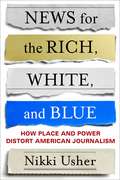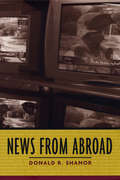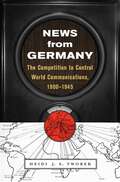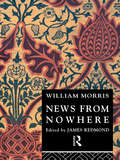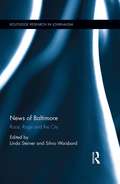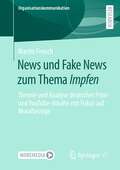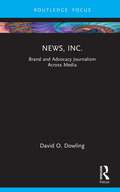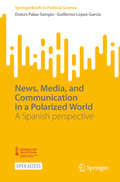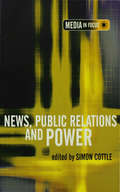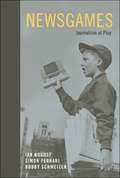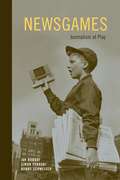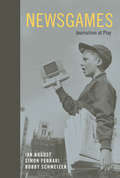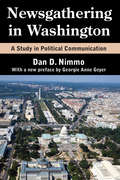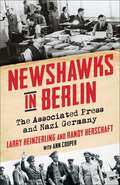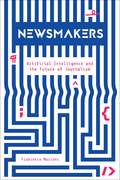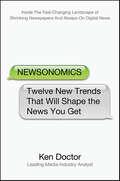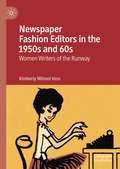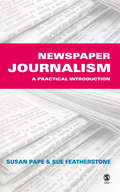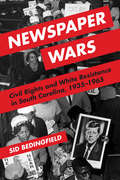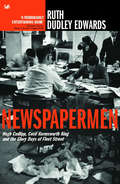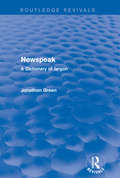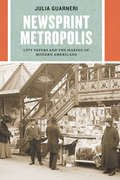- Table View
- List View
News for the Rich, White, and Blue: How Place and Power Distort American Journalism
by Nikki UsherAs cash-strapped metropolitan newspapers struggle to maintain their traditional influence and quality reporting, large national and international outlets have pivoted to serving readers who can and will choose to pay for news, skewing coverage toward a wealthy, white, and liberal audience. Amid rampant inequality and distrust, media outlets have become more out of touch with the democracy they purport to serve. How did journalism end up in such a predicament, and what are the prospects for achieving a more equitable future?In News for the Rich, White, and Blue, Nikki Usher recasts the challenges facing journalism in terms of place, power, and inequality. Drawing on more than a decade of field research, she illuminates how journalists decide what becomes news and how news organizations strategize about the future. Usher shows how newsrooms remain places of power, largely white institutions growing more elite as journalists confront a shrinking job market. She details how Google, Facebook, and the digital-advertising ecosystem have wreaked havoc on the economic model for quality journalism, leaving local news to suffer. Usher also highlights how the handful of likely survivors—well-funded media outlets such as the New York Times—increasingly appeal to a global, “placeless” reader.News for the Rich, White, and Blue concludes with a series of provocative recommendations to reimagine journalism to ensure its resiliency and its ability to speak to a diverse set of issues and readers.
News from Abroad (Headline #No. 250)
by Donald ShanorOver the last two decades, following major conflicts in Kuwait, Kosovo, Afghanistan, and Iraq, Americans began to participate more actively than ever before in the world's numerous nationalist, religious, and ethnic conflicts. During this time, however, American news organizations drastically reduced the resources devoted to in-depth coverage of international affairs. Viewing foreign bureaus as an expensive luxury, major news providers closed overseas offices and cut the number of full-time correspondents working abroad, relying instead upon improvised news crews flown in on short notice to cover the latest crisis.In this insightful and hard-hitting investigation, former international news correspondent Donald R. Shanor follows the deterioration of international reporting and assesses the dangers that arise when U.S. citizens and policymakers are uninformed about foreign events until local problems erupt into international crises. Shanor also considers three major factors—technology, immigration, and globalization—that are influencing and complicating the debate over whether quality or profit should prevail in foreign reporting. In only a decade, the Internet has become a primary source of information for millions of Americans, particularly for younger generations. At the same time, a surge in America's immigrant population is rapidly changing the country's ethic and cultural landscape—making news from abroad local news in many cities—while global business practices are broadening the range of issues directly affecting the average citizen.News from Abroad provides a comprehensive portrait of the contemporary state of international news coverage and argues for the importance of maintaining networks of experienced journalists who can cover difficult subjects, keep Americans informed about the global economy, deliver early warnings of impending disasters and threats to national security, and prevent the United States from falling into cultural isolation.
News from Germany: The Competition to Control World Communications, 1900–1945
by Heidi J. TworekHeidi Tworek’s innovative history reveals how, across two devastating wars, Germany attempted to build a powerful communication empire—and how the Nazis manipulated the news to rise to dominance in Europe and further their global agenda. When the news became a form of international power, it changed the course of history.
News from Nowhere: Or An Epoch Of Rest, Being Some Chapters From A Utopian Romance / William Morris (Routledge English Texts)
by William Morris"This astute and long overdue reappraisal provides a lucid overview and a wealth of contextual information. An excellent resource." -- Shannon L. Rogers, Saint Joseph’s University, Editor, Newsletter of the William Morris Society in the United States"through his insightful introduction and careful selection of documents, [Arata] has created an invaluable edition of News from Nowhere." -- Peter Stansky, Stanford University
News of Baltimore: Race, Rage and the City (Routledge Research in Journalism)
by Silvio Waisbord Linda SteinerThis book examines how the media approached long-standing and long-simmering issues of race, class, violence, and social responsibility in Baltimore during the demonstrations, violence, and public debate in the spring of 2015. Contributors take Baltimore to be an important place, symbol, and marker, though the issues are certainly not unique to Baltimore: they have crucial implications for contemporary journalism in the U.S. These events prompt several questions: How well did journalism do, in Baltimore, nearby and nationally, in explaining the endemic issues besetting Baltimore? What might have been done differently? What is the responsibility of journalists to anticipate and cover these problems? How should they cover social problems in urban areas? What do the answers to such questions suggest about how journalists should in future cover such problems?
News und Fake News zum Thema Impfen: Theorie und Analyse deutscher Print- und YouTube-Inhalte mit Fokus auf Moralbezüge (Organisationskommunikation)
by Martin FenschDesinformation, Fake News zerstören Vertrauen und ver- oder behindern die rekonstruktive Konstruktion von Wirklichkeit mit weitreichenden Folgen für das individuelle Lernen und das gesellschaftliche Handeln. Die Arbeit beschreibt und definiert vor dem Hintergrund einer theoretisch-analytischen Auseinandersetzung mit dem Wahrheitsbegriff das Realphänomen der Fake News. Im empirischen Teil wird die deutschsprachige Impfkommunikation der Jahre 2018-2019 in ausgewählten Printmedien und auf YouTube im Rahmen einer Inhaltsanalyse unter anderem auf Fake News hin untersucht. Ebenfalls wird die Moral Foundations Theory genutzt, um moralische Inhaltsbezüge zu dekodieren und ihren Zusammenhang mit Fake News herzustellen. Kapitel zur Gesundheitskommunikation und zur Geschichte der Impfgegner bieten weiteren Kontext zur Deutung der Ergebnisse.
News, Inc.: Brand and Advocacy Journalism Across Media (Routledge Focus on Journalism Studies)
by David O. DowlingTaking a critical historical approach, this book examines the convergence of journalism and advertising industries that has led to the blurring of commercial and editorial functions within news organizations.This book considers the rise of brand journalism as it is broadly conceived across multiple genres and media forms, from brand-produced interactive documentaries such as Google’s “Beyond the Map” to sponsored multimedia features, videos, and podcasts made by news- and non-governmental organizations. Focusing on cases in North America and Europe, Dowling traces the origins of brand journalism and addresses key debates and disruptions brought about by the widespread adoption of the reportorial role by non-profits and corporations. These include journalistic concerns around threats to independence and impartiality and the commodification of reportorial integrity, as well as the reverse perspective in terms of the advertising industry’s adjustment to consumer ad avoidance. This project aims to situate these media products, industrially and culturally, in the context of competition for market share in the digital publishing industry. Ultimately, the study determines how the popularity of branded news content depends on the adaptability of corporate brands in spaces not typically associated with advertising and, in some cases, not yet discovered by competitors.News, Inc. is recommended reading for advanced students and researchers in fields including Digital Journalism, Public Relations, and Marketing Communications.
News, Media, and Communication in a Polarized World: A Spanish perspective (SpringerBriefs in Political Science)
by Guillermo López-García Dolors Palau-SampioThis Open Access book provides an in-depth analysis of the role held by media and journalists in a fragmented and polarized communication ecosystem that faces the uncertainty of major challenges, such as the impact of the disintermediation process, the pressure of simultaneous over- and disinformation forces, and labor precariousness. It discusses these challenges in the context of business model crises and the loss of journalistic quality. Following an interdisciplinary approach, the book further explores the interaction between communication and political and social change processes, their implications, and their consequences in a hybrid media context. The book examines the loss of credibility of traditional media and democratic institutions and discusses how trust can be restored. While doing so, it appeals to the innate link between journalism and democracy, based on the public&’s trust in the capacity of the media to provide quality content that allows citizens to make informed decisions. As the rise of disinformation presents an incredible challenge for conventional media, due to their position of extreme vulnerability, the book finally analyzes how media and professional journalists, who have traditionally held the responsibility of providing quality information, have to address these issues, while facing the disintegration of former business models and social credibility. This book will appeal to students, scholars, and researchers of political communication, journalism, political science, and related fields, as well as policy-makers and professionals interested in a better understanding of the role of media and journalists in contemporary political and social change processes.
News, Public Relations and Power (The Media in Focus series)
by Simon CottleIntroducing theoretical ideas and the latest empirical findings in this fast-developing field of media communication scholarship and study News, Public Relations and Power has contributions from leading international researchers who address issues such as: the rapid growth of public relations and its impact on news production; state information management strategies in times of internal political dissent; political parties and mediated `spin' conducted at national and local levels; the historically changing nature of war journalism; and tabloid television and forms of cultural representation. The book begins with Simon Cottle's introduction which sets out the key ideas and approaches in the field.
News: The Politics of Illusion, Tenth Edition
by W. Lance BennettFor over thirty years, News: The Politics of Illusion has not simply reflected the political communication field--it has played a major role in shaping it. Today, the familiar news organizations of the legacy press are operating in a fragmenting and expanding mediaverse that resembles a big bang of proliferating online competitors that are challenging the very definition of news itself. Audience-powered sites such as the Huffington Post and Vox blend conventional political reporting with opinion blogs, celebrity gossip, and other ephemera aimed at getting clicks and shares. At the same time, the rise of serious investigative organizations such as ProPublica presents yet a different challenge to legacy journalism. Lance Bennett's thoroughly revised tenth edition offers the most up-to-date guide to understanding how and why the media and news landscapes are being transformed. It explains the mix of old and new, and points to possible outcomes. Where areas of change are clearly established, key concepts from earlier editions have been revised. There are new case studies, updates on old favorites, and insightful analyses of how the new media system and novel kinds of information and engagement are affecting our politics. As always, News presents fresh evidence and arguments that invite new ways of thinking about the political information system and its place in democracy.
Newsgames
by Ian Bogost Simon Ferrari Bobby SchweizerJournalism has embraced digital media in its struggle to survive. But most online journalism just translates existing practices to the Web: stories are written and edited as they are for print; video and audio features are produced as they would be for television and radio. The authors of Newsgames propose a new way of doing good journalism: videogames. Videogames are native to computers rather than a digitized form of prior media. Games simulate how things work by constructing interactive models; journalism as game involves more than just revisiting old forms of news production. Wired magazine's game Cutthroat Capitalism, for example, explains the economics of Somali piracy by putting the player in command of a pirate ship, offering choices for hostage negotiation strategies. Videogames do not offer a panacea for the ills of contemporary news organizations. But if the industry embraces them as a viable method of doing journalism--not just an occasional treat for online readers--newsgames can make a valuable contribution.
Newsgames
by Ian Bogost Simon Ferrari Bobby SchweizerJournalism has embraced digital media in its struggle to survive. But most online journalism just translates existing practices to the Web: stories are written and edited as they are for print; video and audio features are produced as they would be for television and radio. The authors of Newsgames propose a new way of doing good journalism: videogames. Videogames are native to computers rather than a digitized form of prior media. Games simulate how things work by constructing interactive models; journalism as game involves more than just revisiting old forms of news production. Wired magazine's game Cutthroat Capitalism, for example, explains the economics of Somali piracy by putting the player in command of a pirate ship, offering choices for hostage negotiation strategies. Videogames do not offer a panacea for the ills of contemporary news organizations. But if the industry embraces them as a viable method of doing journalism--not just an occasional treat for online readers--newsgames can make a valuable contribution.
Newsgames: Journalism at Play
by Ian Bogost Simon Ferrari Bobby SchweizerHow videogames offer a new way to do journalism.Journalism has embraced digital media in its struggle to survive. But most online journalism just translates existing practices to the Web: stories are written and edited as they are for print; video and audio features are produced as they would be for television and radio. The authors of Newsgames propose a new way of doing good journalism: videogames.Videogames are native to computers rather than a digitized form of prior media. Games simulate how things work by constructing interactive models; journalism as game involves more than just revisiting old forms of news production. Wired magazine's game Cutthroat Capitalism, for example, explains the economics of Somali piracy by putting the player in command of a pirate ship, offering choices for hostage negotiation strategies.Videogames do not offer a panacea for the ills of contemporary news organizations. But if the industry embraces them as a viable method of doing journalism—not just an occasional treat for online readers—newsgames can make a valuable contribution.
Newsgathering in Washington: A Study in Political Communication
by Georgie Anne Geyer Dan NimmoIn the early twentieth century, Pulitzer Prize-winning journalist Walter Lippmann said that the presentation of truthful news lies at the heart of democracy. This volume strong strong stems from Dan D. Nimmo's conviction that opinion and policymaking are also significant, interrelated processes within any political system. A democracy poses problematic questions of the manner and means by which political ideas, opinions, and issues are transmitted throughout the body politic. In the United States, such communication is carried on primarily through the news media. Reporters and their sources interact to form crucial relationships linking citizen and official. Nimmo focuses on that interaction, using personal interviews with selected samples of Washington correspondents and their official news sources as his evidence. Nimmo's research examines the relationships that develop between news sources and reporters as each engages in political communication, indicates the factors most influential in determining such relationships, and suggests the implications such findings have for interpreting the tension that characterizes government-press relations in a democracy such as the United States. In this era of heightened attention to the role of the media in political discourse, reissuance of this volume could not be timelier. This study features a new preface by Daniel Pearl Award winner Georgie Anne Geyer. It should be read by all media specialists, communication scholars, and journalists, and will be valuable for those entering these fields as well.
Newshawks in Berlin: The Associated Press and Nazi Germany
by Larry Heinzerling Randy HerschaftAfter the Nazis came to power in Germany in 1933, the Associated Press (AP) brought news about life under the Third Reich to tens of millions of American readers. The AP was America’s most important source for foreign news, but to continue reporting under the Nazi regime the agency made both journalistic and moral compromises. Its reporters and photographers in Berlin endured onerous censorship, complied with anti-Semitic edicts, and faced accusations of spreading pro-Nazi propaganda. Yet despite restrictions, pressures, and concessions, AP’s Berlin “newshawks” provided more than a thousand U.S. newspapers with extensive coverage of the Nazi campaigns to conquer Europe and annihilate the continent’s Jews.Newshawks in Berlin reveals how the Associated Press covered Nazi Germany from its earliest days through the aftermath of World War II. Larry Heinzerling and Randy Herschaft accessed previously classified government documents; plumbed diary entries, letters, and memos; and reviewed thousands of published stories and photos to examine what the AP reported and what it left out. Their research uncovers fierce internal debates about how to report in a dictatorship, and it reveals decisions that sometimes prioritized business ambitions over journalistic ethics. The book also documents the AP’s coverage of the Holocaust and its unveiling. Featuring comprehensive research and a memorable cast of characters, this book illuminates how the dilemmas of reporting on Nazi Germany remain familiar for journalists reporting on authoritarian regimes today.
Newsletters and Press Releases: Bullet Guides
by Brian SalterOpen this book and you will - Get people's attention - Write compelling copy - Make an impact in the media - Keep your customers coming back
Newsletters and Press Releases: Bullet Guides
by Brian SalterOpen this book and you will- Get people's attention- Write compelling copy- Make an impact in the media- Keep your customers coming back
Newsmakers: Artificial Intelligence and the Future of Journalism
by Francesco MarconiWill the use of artificial intelligence (AI), algorithms, and smart machines be the end of journalism as we know it—or its savior? In Newsmakers, Francesco Marconi, who has led the development of the Associated Press and Wall Street Journal’s use of AI in journalism, offers a new perspective on the potential of these technologies. He explains how reporters, editors, and newsrooms of all sizes can take advantage of the possibilities they provide to develop new ways of telling stories and connecting with readers.Marconi analyzes the challenges and opportunities of AI through case studies ranging from financial publications using algorithms to write earnings reports to investigative reporters analyzing large data sets to outlets determining the distribution of news on social media. Newsmakers contends that AI can augment—not automate—the industry, allowing journalists to break more news more quickly while simultaneously freeing up their time for deeper analysis. Marshaling insights drawn from firsthand experience, Marconi maps a media landscape transformed by artificial intelligence for the better. In addition to considering the benefits of these new technologies, Marconi stresses the continuing need for editorial and institutional oversight. Newsmakers outlines the important questions that journalists and media organizations should consider when integrating AI and algorithms into their workflow. For journalism students as well as seasoned media professionals, Marconi’s insights provide much-needed clarity and a practical roadmap for how AI can best serve journalism.
Newsonomics: Twelve New Trends That Will Shape the News You Get
by Ken DoctorThe New NewsReports of the death of the news media are highly premature, though you wouldn't know it from the media's own headlines. Ken Doctor goes far beyond those headlines, taking an authoritative look at the fast-emerging future.The Twelve Laws of Newsonomics reveal the kinds of news that readers will get and that journalists (and citizens) will produce as we enter the first truly digital news decade. A new Digital Dozen, global powerhouses from The New York Times, News Corp, and CNN to NBC, the BBC, and NPR will dominate news across the globe, Locally, a colorful assortment of emerging news players, from Boston to San Diego, are rewriting the rules of city reporting, Newsonomics provides a new sense of the news we'll get on paper, on screen, on the phone, by blog, by podcast, and via Facebook and Twitter. It also offers a new way to understand the why and how of the changes, and where the Googles, Yahoos and Microsofts fit in. Newsonomics pays special attention to media and journalism students in a chapter on the back-to-the-future skills they'll need, while marketing professionals get their own view of what the changes mean to them.
Newspaper Fashion Editors in the 1950s and 60s: Women Writers of the Runway
by Kimberly Wilmot VossThis book documents the careers of newspaper fashion editors and details what the fashion sections included in the post-World War II years. The analysis covers social, political and economic aspects of fashion. It also addresses journalism ethics, fashion show reporting and the decline in fashion journalism editor positions.
Newspaper Journalism: A Practical Introduction
by Susan Featherstone Susan Pape'As well as guides on how to report courts and councils, Newspaper Journalism offers tips on how to write both news stories and features and how to make and keep contacts. The tips are packed with real life examples from journalists working on provincial newspapers. A worthwhile read - and not just for the latest newshound to join the press pack' - www.HoldtheFrontPage.co.uk 'This is lucid, lean and up-to-date introduction to newspaper journalism and how to do it' - Jane Taylor, The Surrey Institute of Art and Design A practical introduction to journalism, and the broader context in which journalists operate, Newspaper Journalism covers the key elements and distinctive features that constitute good newspaper journalism. Engagingly written, the book is also a rich resource of real life examples, anecdotes, case studies and exercises. Susan Pape and Susan Featherstone have drawn on their considerable experience to provide a solid grounding in the principles and practice of newspaper journalism. The resulting book recognises the needs of the profession and those seeking to enter it.
Newspaper Wars: Civil Rights and White Resistance in South Carolina, 1935-1965
by Sid BedingfieldAgainst all odds, the seeds of social change found purchase in mid-twentieth century South Carolina. Newspaperman John McCray and his allies at the Lighthouse and Informer challenged readers to "rebel and fight"--to reject the "slavery of thought and action" and become "progressive fighters" for equality. Newspaper Wars traces the role journalism played in the fight for civil rights in South Carolina from the 1930s through the 1960s. Moving the press to the center of the political action, Sid Bedingfield tells the stories of the long-overlooked men and women on the front lines of a revolution. African American progress sparked a battle to shape South Carolina's civic life, with civil rights activists arrayed against white journalists determined to preserve segregation through massive resistance. As that strategy failed, white newspapers turned to overt political action and crafted the still-prevalent narratives that aligned southern whites with the national conservative movement. A fascinating portrait of a defining time, Newspaper Wars analyzes the role journalism played--and still can play--during times of social, cultural, and political change.
Newspapermen: Hugh Cudlipp, Cecil Harmsworth King and the Glory Days of Fleet Street
by Ruth Dudley EdwardsThey were 'Cudlipp' and 'Mr King' when they met in 1935. At 21, gregarious, extrovert and irreverent Hugh Cudlipp had many years of journalistic experience: at 34, shy, introspective and solemn Cecil Harmsworth King, haunted by the ghost of Uncle Alfred, Lord Northcliffe, the great press magnate, and bitter towards Uncle Harold, Lord Rothermere of the Daily Mail, was fighting his way up in the family business. Opposites in most respects, they were complementary in talents and had in common a deep concern for the underdog. Cudlipp, the journalistic genius, and King, the formidable intellect, were to become, in Cudlipp's words, 'the Barnum and Bailey' of Fleet Street. Together, on the foundation of the populist Daily Mirror, they created the biggest publishing empire in the world. Yet their relationship foundered sensationally in 1968, when - as King tried to topple the Prime Minister - Cudlipp toppled King. Through the story of two extraordinary men, Ruth Dudley Edwards gives us a riveting portrait of Fleet Street in its heyday.
Newspeak: A Dictionary of Jargon (Routledge Revivals)
by Jonathon GreenGeorge Orwell coined the term ‘Newspeak’ for his novel 1984, the purpose of which was designed to shrink vocabularies and eliminate subtlety and nuance. For this dictionary, first published to herald the year 1984, Jonathon Green compiled nearly 8, 000 entries – selected from the slangs and specific vocabularies of trades, professions and interests – covering such areas as the world of entertainment, the media, the military economics, and finance. This dictionary provides an accurate and useful linguistic guide for students of lexicography and an interesting compendium for the general inquisitive reader.
Newsprint Metropolis: City Papers and the Making of Modern Americans
by Julia GuarneriAt the close of the nineteenth century, new printing and paper technologies fueled an expansion of the newspaper business. Newspapers soon saturated the United States, especially its cities, which were often home to more than a dozen dailies apiece. Using New York, Philadelphia, Milwaukee, and Chicago as case studies, Julia Guarneri shows how city papers became active agents in creating metropolitan spaces and distinctive urban cultures. Newsprint Metropolis offers a vivid tour of these papers, from the front to the back pages. Paying attention to much-loved features, including comic strips, sports pages, advice columns, and Sunday magazines, she tells the linked histories of newspapers and of the cities they served. Guarneri shows how themed sections for women, businessmen, sports fans, and suburbanites illustrated entire ways of life built around consumer products. But while papers provided a guide to individual upward mobility, they also fostered a climate of civic concern and responsibility. Charity campaigns and metropolitan sections painted portraits of distinctive, cohesive urban communities. Real estate sections and classified ads boosted the profile of the suburbs, expanding metropolitan areas while maintaining cities’ roles as economic and information hubs. All the while, editors were drawing in new reading audiences—women, immigrants, and working-class readers—helping to give rise to the diverse, contentious, and commercial public sphere of the twentieth century.
